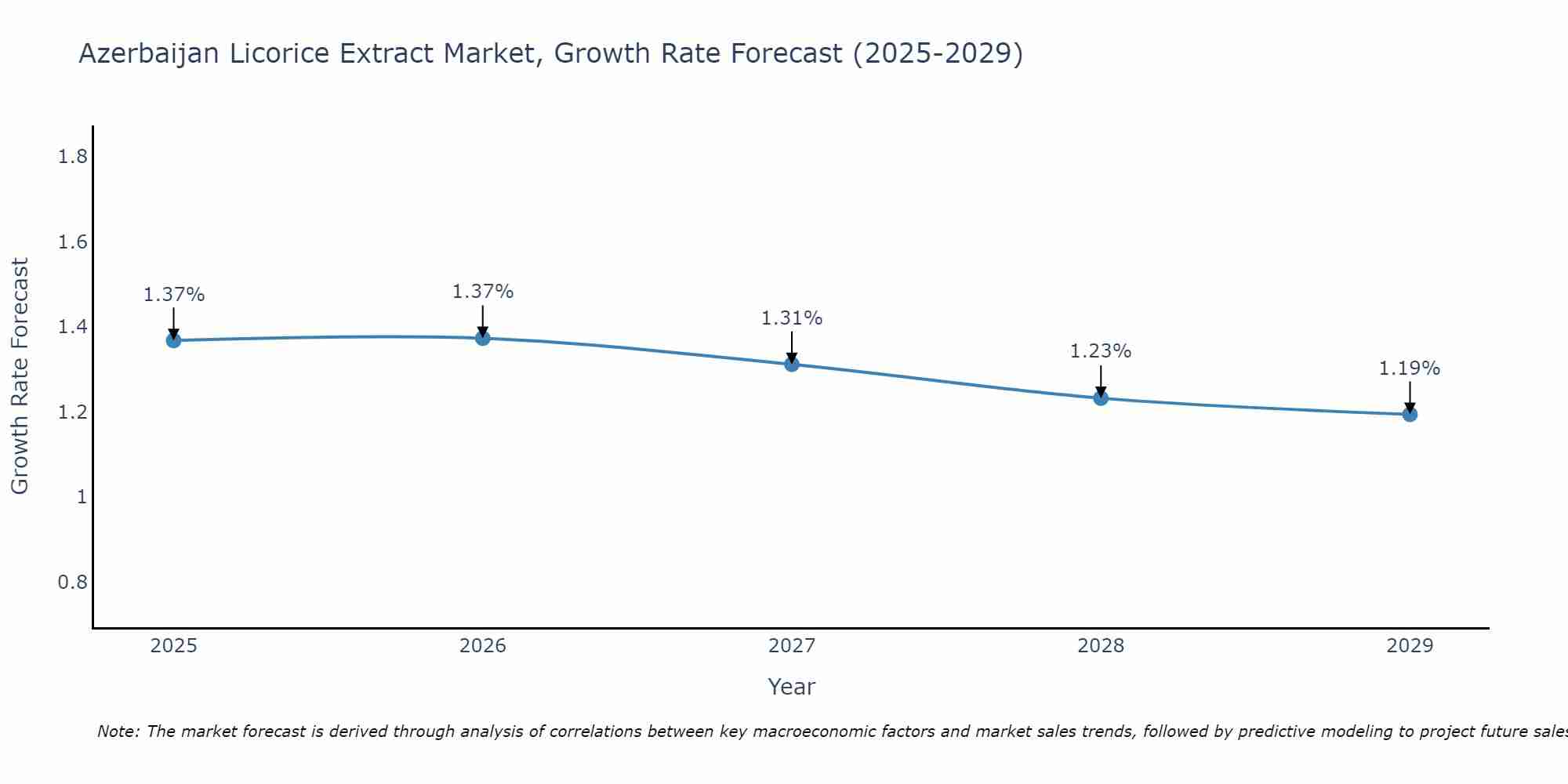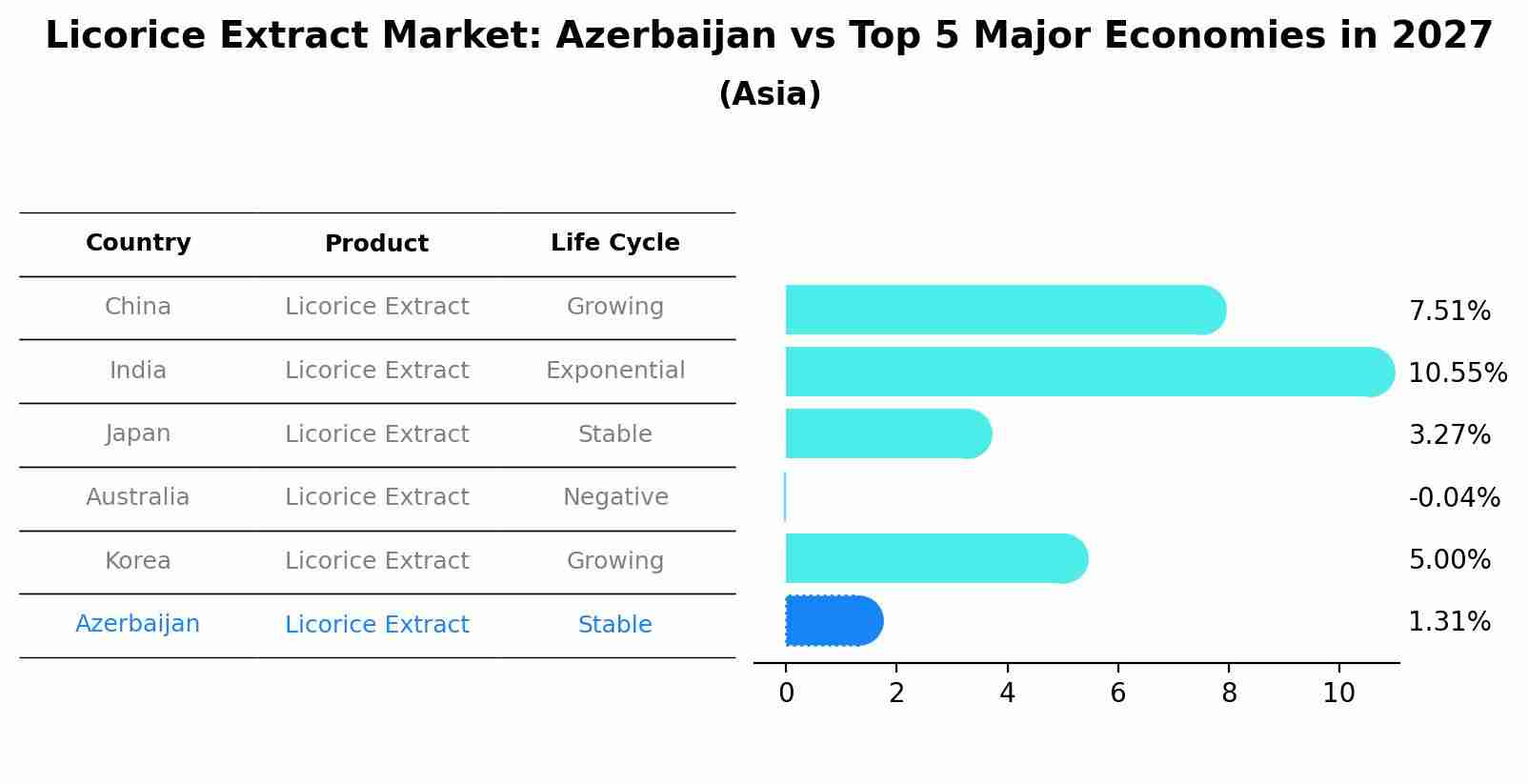Azerbaijan Licorice Extract Market Outlook | Companies, Revenue, Growth, Trends, Forecast, Analysis, Size, Industry, Value, COVID-19 IMPACT & Share
| Product Code: ETC389037 | Publication Date: Aug 2022 | Updated Date: Apr 2025 | Product Type: Market Research Report | |
| Publisher: 6Wresearch | Author: Shubham Padhi | No. of Pages: 75 | No. of Figures: 35 | No. of Tables: 20 |
Azerbaijan Licorice Extract Market Size Growth Rate
The Azerbaijan Licorice Extract Market is projected to witness mixed growth rate patterns during 2025 to 2029. Growth accelerates to 1.37% in 2026, following an initial rate of 1.37%, before easing to 1.19% at the end of the period.

Licorice Extract Market: Azerbaijan vs Top 5 Major Economies in 2027 (Asia)
In the Asia region, the Licorice Extract market in Azerbaijan is projected to expand at a stable growth rate of 1.31% by 2027. The largest economy is China, followed by India, Japan, Australia and South Korea.

Azerbaijan Licorice Extract Market Synopsis
The licorice extract market in Azerbaijan encompasses natural extracts derived from the roots of the licorice plant, valued for their sweet flavor, medicinal properties, and use in various industries such as food and beverage, pharmaceuticals, and personal care. Licorice extract is used as a flavoring agent, sweetener, and herbal remedy in products such as confectionery, herbal teas, dietary supplements, and skincare products. With the increasing demand for natural ingredients and traditional remedies in Azerbaijan, driven by health-conscious consumers and wellness trends, the licorice extract market is expected to rise. Factors such as licorice cultivation, extraction methods, and regulatory compliance will influence the dynamics of this market in Azerbaijan.
Drivers of the market
The Licorice Extract market in Azerbaijan is primarily driven by factors such as the increasing demand for natural and herbal ingredients in the food and beverage, pharmaceutical, and cosmetic industries, the rising awareness about the health benefits of licorice, and the growing popularity of traditional medicine practices. Licorice extract, derived from the roots of the licorice plant, is valued for its sweet flavor, medicinal properties, and versatility in various applications. The market is influenced by trends such as the incorporation of licorice extract into confectionery products, herbal supplements, skincare formulations, and herbal teas. Additionally, factors such as the expansion of the natural and organic food sector, the emergence of licorice-based dietary supplements for digestive health, and the demand for licorice-flavored beverages and candies drive market growth in Azerbaijan. Moreover, collaborations between food manufacturers and licorice extract suppliers, investments in research and development for new product formulations, and marketing efforts to promote the health benefits of licorice contribute to market expansion.
Challenges of the market
The Azerbaijan Licorice Extract market faces several challenges hindering its growth and sustainability within the food, beverage, pharmaceutical, and cosmetic industries. One significant challenge is the variability in licorice root supply due to environmental factors and agricultural conditions. Licorice extract production relies heavily on the availability and quality of licorice roots, which can be influenced by factors such as climate change, soil degradation, and fluctuations in agricultural practices. Uncertainties in licorice root supply can lead to price volatility, supply chain disruptions, and challenges in meeting market demand for licorice extract products. Moreover, regulatory constraints and quality standards pose challenges for licorice extract manufacturers and exporters in Azerbaijan. The licorice extract industry must adhere to stringent regulations and standards related to food safety, pharmaceutical purity, and cosmetic ingredient labeling. Ensuring compliance with these requirements, obtaining necessary certifications, and navigating regulatory approval processes can be complex and time-consuming, particularly for small and medium-sized enterprises (SMEs) operating in the licorice extract market. Additionally, market competition and product differentiation present challenges for licorice extract suppliers in Azerbaijan. The licorice extract market is characterized by a diverse range of products, including liquid extracts, powders, and concentrates, each with its applications and quality specifications. Competing effectively in the market requires differentiation through factors such as product quality, purity, consistency, and value-added attributes. Developing innovative extraction technologies, enhancing product formulations, and establishing strong branding and marketing strategies are essential for gaining a competitive edge in the licorice extract market. Furthermore, sustainability concerns and ethical sourcing practices pose challenges for licorice extract producers and buyers in Azerbaijan. Licorice cultivation and harvesting practices can have environmental and social impacts, such as deforestation, habitat loss, and labor rights violations. Addressing these concerns requires commitments to sustainable sourcing, ethical supply chain management, and transparency in procurement practices. Implementing sustainable agriculture initiatives, promoting fair trade practices, and engaging with local communities are essential for ensuring the long-term viability and ethical integrity of the licorice extract market. To address these challenges, collaborative efforts among stakeholders are essential. These include government agencies, industry associations, research institutions, and international organizations. Initiatives must focus on promoting sustainable licorice cultivation practices, strengthening regulatory compliance and quality assurance mechanisms, fostering innovation and product development, and promoting ethical sourcing and supply chain transparency. By addressing these challenges collectively, the Azerbaijan Licorice Extract market can overcome obstacles and achieve long-term growth and competitiveness in the global market.
Government Policy of the market
The Azerbaijan government acknowledges the importance of licorice extract in various industries, including food and beverage, pharmaceuticals, and cosmetics, and has taken steps to support its production and usage. Recognizing the potential of licorice extract as a versatile ingredient with numerous health benefits, policies have been implemented to ensure its quality, safety, and sustainability. These policies focus on creating a regulatory framework that ensures compliance with safety standards, quality requirements, and environmental regulations in licorice extract manufacturing and trade. Additionally, initiatives promoting research, innovation, and market development contribute to market growth and competitiveness. By fostering a conducive regulatory environment and investing in research infrastructure, skills development, and industry partnerships, Azerbaijan aims to enhance its position in the global licorice extract market and promote economic development and public health.
Key Highlights of the Report:
- Azerbaijan Licorice Extract Market Outlook
- Market Size of Azerbaijan Licorice Extract Market, 2024
- Forecast of Azerbaijan Licorice Extract Market, 2031
- Historical Data and Forecast of Azerbaijan Licorice Extract Revenues & Volume for the Period 2018 - 2031
- Azerbaijan Licorice Extract Market Trend Evolution
- Azerbaijan Licorice Extract Market Drivers and Challenges
- Azerbaijan Licorice Extract Price Trends
- Azerbaijan Licorice Extract Porter's Five Forces
- Azerbaijan Licorice Extract Industry Life Cycle
- Historical Data and Forecast of Azerbaijan Licorice Extract Market Revenues & Volume By Product Type for the Period 2018 - 2031
- Historical Data and Forecast of Azerbaijan Licorice Extract Market Revenues & Volume By Food Grade for the Period 2018 - 2031
- Historical Data and Forecast of Azerbaijan Licorice Extract Market Revenues & Volume By Feed Grade for the Period 2018 - 2031
- Historical Data and Forecast of Azerbaijan Licorice Extract Market Revenues & Volume By Pharmaceutical Grade for the Period 2018 - 2031
- Historical Data and Forecast of Azerbaijan Licorice Extract Market Revenues & Volume By Form for the Period 2018 - 2031
- Historical Data and Forecast of Azerbaijan Licorice Extract Market Revenues & Volume By Powder for the Period 2018 - 2031
- Historical Data and Forecast of Azerbaijan Licorice Extract Market Revenues & Volume By Liquid for the Period 2018 - 2031
- Historical Data and Forecast of Azerbaijan Licorice Extract Market Revenues & Volume By Block for the Period 2018 - 2031
- Historical Data and Forecast of Azerbaijan Licorice Extract Market Revenues & Volume By Application for the Period 2018 - 2031
- Historical Data and Forecast of Azerbaijan Licorice Extract Market Revenues & Volume By Food & Beverages for the Period 2018 - 2031
- Historical Data and Forecast of Azerbaijan Licorice Extract Market Revenues & Volume By Pharmaceutical for the Period 2018 - 2031
- Historical Data and Forecast of Azerbaijan Licorice Extract Market Revenues & Volume By Tobacco for the Period 2018 - 2031
- Historical Data and Forecast of Azerbaijan Licorice Extract Market Revenues & Volume By Others for the Period 2018 - 2031
- Azerbaijan Licorice Extract Import Export Trade Statistics
- Market Opportunity Assessment By Product Type
- Market Opportunity Assessment By Form
- Market Opportunity Assessment By Application
- Azerbaijan Licorice Extract Top Companies Market Share
- Azerbaijan Licorice Extract Competitive Benchmarking By Technical and Operational Parameters
- Azerbaijan Licorice Extract Company Profiles
- Azerbaijan Licorice Extract Key Strategic Recommendations
Frequently Asked Questions About the Market Study (FAQs):
- Single User License$ 1,995
- Department License$ 2,400
- Site License$ 3,120
- Global License$ 3,795
Search
Related Reports
- Australia IT Asset Disposal Market (2025-2031) | Strategy, Consumer Insights, Analysis, Investment Trends, Opportunities, Growth, Size, Share, Industry, Revenue, Segments, Value, Segmentation, Supply, Forecast, Restraints, Outlook, Competition, Drivers, Trends, Demand, Pricing Analysis, Competitive, Strategic Insights, Companies, Challenges
- UAE Building Thermal Insulation Market Outlook (2025-2031) | Revenue, Companies, Share, Trends, Growth, Size, Forecast, Industry, Analysis & Value
- Portugal Electronic Document Management Market (2025-2031) | Strategy, Consumer Insights, Analysis, Investment Trends, Opportunities, Growth, Size, Share, Industry, Revenue, Segments, Value, Segmentation, Supply, Forecast, Restraints, Outlook, Competition, Drivers, Trends, Demand, Pricing Analysis, Competitive, Strategic Insights, Companies, Challenges
- France Electronic Document Management Market (2025-2031) | Strategy, Consumer Insights, Analysis, Investment Trends, Opportunities, Growth, Size, Share, Industry, Revenue, Segments, Value, Segmentation, Supply, Forecast, Restraints, Outlook, Competition, Drivers, Trends, Demand, Pricing Analysis, Competitive, Strategic Insights, Companies, Challenges
- Portugal Occupational Health & Safety Services Market (2025-2031) | Strategy, Consumer Insights, Analysis, Investment Trends, Opportunities, Growth, Size, Share, Industry, Revenue, Segments, Value, Segmentation, Supply, Forecast, Restraints, Outlook, Competition, Drivers, Trends, Demand, Pricing Analysis, Competitive, Strategic Insights, Companies, Challenges
- Netherlands Occupational Health and Safety Services Market (2025-2031) | Strategy, Consumer Insights, Analysis, Investment Trends, Opportunities, Growth, Size, Share, Industry, Revenue, Segments, Value, Segmentation, Supply, Forecast, Restraints, Outlook, Competition, Drivers, Trends, Demand, Pricing Analysis, Competitive, Strategic Insights, Companies, Challenges
- Belgium and Luxembourg Facility Management Market (2025-2031) | Strategy, Consumer Insights, Analysis, Investment Trends, Opportunities, Growth, Size, Share, Industry, Revenue, Segments, Value, Segmentation, Supply, Forecast, Restraints, Outlook, Competition, Drivers, Trends, Demand, Pricing Analysis, Competitive, Strategic Insights, Companies, Challenges
- Russia Women Intimate Apparel Market (2025-2031) | Strategy, Consumer Insights, Analysis, Investment Trends, Opportunities, Growth, Size, Share, Industry, Revenue, Segments, Value, Segmentation, Supply, Forecast, Restraints, Outlook, Competition, Drivers, Trends, Demand, Pricing Analysis, Competitive, Strategic Insights, Companies, Challenges
- Africa Chocolate Market (2025-2031) | Size, Share, Trends, Growth, Revenue, Analysis, Forecast, industry & Outlook
- Global Hydroxychloroquine And Chloroquine Market (2025-2031) | Industry, Trends, Size, Outlook, Growth, Value, Companies, Revenue, Analysis, Share, Forecast
Industry Events and Analyst Meet
Our Clients
Whitepaper
- Middle East & Africa Commercial Security Market Click here to view more.
- Middle East & Africa Fire Safety Systems & Equipment Market Click here to view more.
- GCC Drone Market Click here to view more.
- Middle East Lighting Fixture Market Click here to view more.
- GCC Physical & Perimeter Security Market Click here to view more.
6WResearch In News
- Doha a strategic location for EV manufacturing hub: IPA Qatar
- Demand for luxury TVs surging in the GCC, says Samsung
- Empowering Growth: The Thriving Journey of Bangladesh’s Cable Industry
- Demand for luxury TVs surging in the GCC, says Samsung
- Video call with a traditional healer? Once unthinkable, it’s now common in South Africa
- Intelligent Buildings To Smooth GCC’s Path To Net Zero













